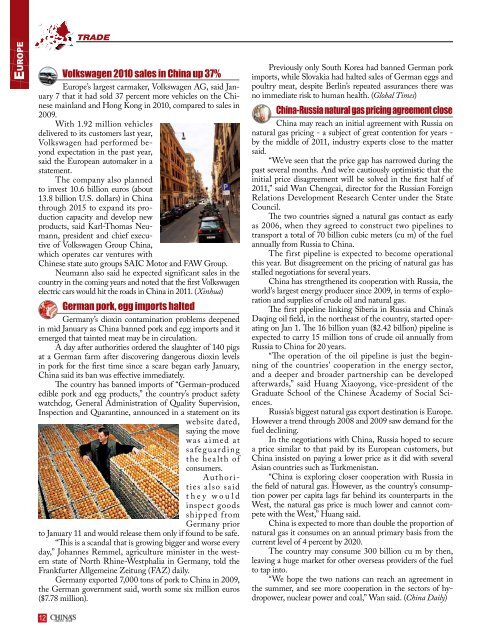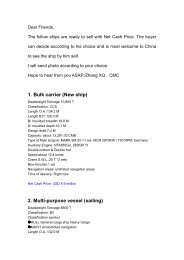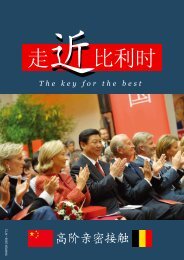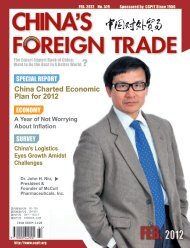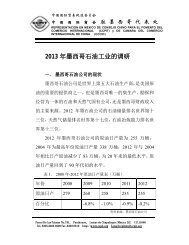You also want an ePaper? Increase the reach of your titles
YUMPU automatically turns print PDFs into web optimized ePapers that Google loves.
Europe<br />
12<br />
<strong>TRADE</strong><br />
Volkswagen 2010 sales in China up 37%<br />
Europe’s largest carmaker, Volkswagen AG, said January<br />
7 that it had sold 37 percent more vehicles on the Chinese<br />
mainland and Hong Kong in 2010, compared to sales in<br />
2009.<br />
With 1.92 million vehicles<br />
delivered to its customers last year,<br />
Volkswagen had performed beyond<br />
expectation in the past year,<br />
said the European automaker in a<br />
statement.<br />
The company also planned<br />
to invest 10.6 billion euros (about<br />
13.8 billion U.S. dollars) in China<br />
through 2015 to expand its production<br />
capacity and develop new<br />
products, said Karl-Thomas Neumann,<br />
president and chief executive<br />
of Volkswagen Group China,<br />
which operates car ventures with<br />
Chinese state auto groups SAIC Motor and FAW Group.<br />
Neumann also said he expected significant sales in the<br />
country in the coming years and noted that the first Volkswagen<br />
electric cars would hit the roads in China in 2011. (Xinhua)<br />
German pork, egg imports halted<br />
Germany’s dioxin contamination problems deepened<br />
in mid January as China banned pork and egg imports and it<br />
emerged that tainted meat may be in circulation.<br />
A day after authorities ordered the slaughter of 140 pigs<br />
at a German farm after discovering dangerous dioxin levels<br />
in pork for the first time since a scare began early January,<br />
China said its ban was effective immediately.<br />
The country has banned imports of “German-produced<br />
edible pork and egg products,” the country’s product safety<br />
watchdog, General Administration of Quality Supervision,<br />
Inspection and Quarantine, announced in a statement on its<br />
website dated,<br />
saying the move<br />
was aimed at<br />
safeguarding<br />
the health of<br />
consumers.<br />
Authorities<br />
also said<br />
t h e y w o u l d<br />
inspect goods<br />
shipped from<br />
Germany prior<br />
to January 11 and would release them only if found to be safe.<br />
“This is a scandal that is growing bigger and worse every<br />
day,” Johannes Remmel, agriculture minister in the western<br />
state of North Rhine-Westphalia in Germany, told the<br />
Frankfurter Allgemeine Zeitung (FAZ) daily.<br />
Germany exported 7,000 tons of pork to China in 2009,<br />
the German government said, worth some six million euros<br />
($7.78 million).<br />
Previously only South Korea had banned German pork<br />
imports, while Slovakia had halted sales of German eggs and<br />
poultry meat, despite Berlin’s repeated assurances there was<br />
no immediate risk to human health. (Global Times)<br />
China-Russia natural gas pricing agreement close<br />
China may reach an initial agreement with Russia on<br />
natural gas pricing - a subject of great contention for years -<br />
by the middle of 2011, industry experts close to the matter<br />
said.<br />
“We’ve seen that the price gap has narrowed during the<br />
past several months. And we’re cautiously optimistic that the<br />
initial price disagreement will be solved in the first half of<br />
2011,” said Wan Chengcai, director for the Russian Foreign<br />
Relations Development Research Center under the State<br />
Council.<br />
The two countries signed a natural gas contact as early<br />
as 2006, when they agreed to construct two pipelines to<br />
transport a total of 70 billion cubic meters (cu m) of the fuel<br />
annually from Russia to China.<br />
The first pipeline is expected to become operational<br />
this year. But disagreement on the pricing of natural gas has<br />
stalled negotiations for several years.<br />
China has strengthened its cooperation with Russia, the<br />
world's largest energy producer since 2009, in terms of exploration<br />
and supplies of crude oil and natural gas.<br />
The first pipeline linking Siberia in Russia and China’s<br />
Daqing oil field, in the northeast of the country, started operating<br />
on Jan 1. The 16 billion yuan ($2.42 billion) pipeline is<br />
expected to carry 15 million tons of crude oil annually from<br />
Russia to China for 20 years.<br />
“The operation of the oil pipeline is just the beginning<br />
of the countries’ cooperation in the energy sector,<br />
and a deeper and broader partnership can be developed<br />
afterwards,” said Huang Xiaoyong, vice-president of the<br />
Graduate School of the Chinese Academy of Social Sciences.<br />
Russia’s biggest natural gas export destination is Europe.<br />
However a trend through 2008 and 2009 saw demand for the<br />
fuel declining.<br />
In the negotiations with China, Russia hoped to secure<br />
a price similar to that paid by its European customers, but<br />
China insisted on paying a lower price as it did with several<br />
Asian countries such as Turkmenistan.<br />
“China is exploring closer cooperation with Russia in<br />
the field of natural gas. However, as the country’s consumption<br />
power per capita lags far behind its counterparts in the<br />
West, the natural gas price is much lower and cannot compete<br />
with the West,” Huang said.<br />
China is expected to more than double the proportion of<br />
natural gas it consumes on an annual primary basis from the<br />
current level of 4 percent by 2020.<br />
The country may consume 300 billion cu m by then,<br />
leaving a huge market for other overseas providers of the fuel<br />
to tap into.<br />
“We hope the two nations can reach an agreement in<br />
the summer, and see more cooperation in the sectors of hydropower,<br />
nuclear power and coal,” Wan said. (China Daily)


